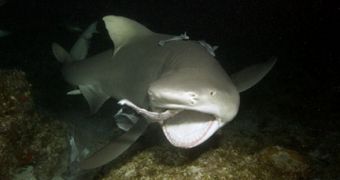Sharks gained their dominance in the seas owing to their formidable teeth-jaws, speed and senses. For hunting, sharks are endowed with keen sight, olfaction and hearing (they pick up sounds from 2 km (1.2 mi) away). The lateral line helps them detect vibrations produced by a struggle in the water, like the convulsions of a speared fish (that's why when fishing with an arbalet, one should pull the speared fish out of the water as quick as possible). They also have the ampullae of Lorenzini, small channels located around the nostrils that enable sharks to detect weak electric fields of the beating hearts, gills or swimming muscles of the possible victims. These organs also enables them to feel Earth's magnetic field (knowing where south and north are located).
A new research shows that sharks could forecast storms.
Lauren Smith, 24, a marine biology student, is investigating in her nearly completed PhD studies the pressure-sensing abilities of the sharks. In the future, people could monitor the behavior of sharks to forecast violent storms. The investigation was partly made in an altitude chamber at the National Hyperbaric Centre in Aberdeen.
Smith previously investigated lemon sharks at the Bimini Biological Field Station in the Bahamas and the lesser spotted dogfish shark at Aberdeen University's altitude chamber at the National Hyperbaric Centre.
The research was inspired by an earlier observations in shark behavior in Florida, during the Hurricane Gabrielle in 2001, when juvenile blacktip sharks retreated into deeper waters when the storm was approaching.
"I was delighted to have been able to explore this area for my PhD, particularly as it's the first time it's really been explored fully. Who can say if this could lead to sharks predicting weather fronts, there's so much more we need to understand. But it certainly opens the way to more research," said Smith.
The chamber's changes in pressure imitate the pressure changes caused by weather fronts, which occur in and around the ocean. Sharks headed for deeper water before the arrival of the bad weather.
It is known that sharks feel pressure using hair cells in their balance system. At the Bimini Shark Lab, Smith placed on juvenile lemon sharks data-logging tags, which recorded pressure and temperature, while also tracking the sharks' tours via GPS technology. In Aberdeen, the impact of tidal and temperature changes on dogfish were investigated.

 14 DAY TRIAL //
14 DAY TRIAL //